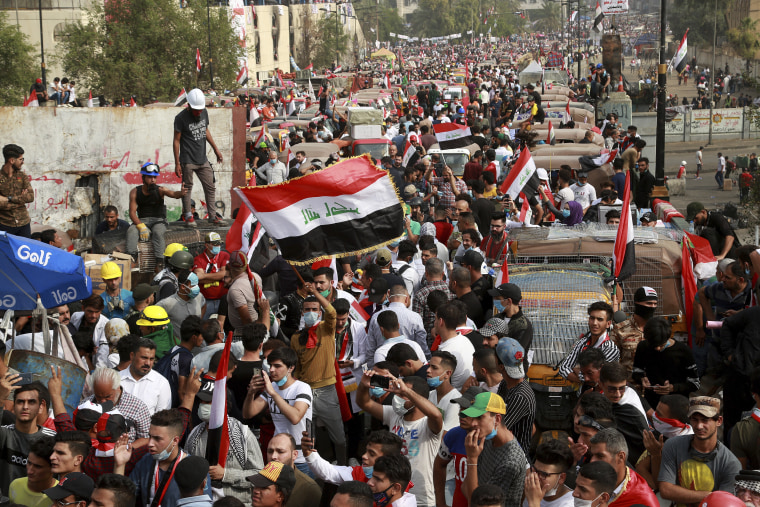Scenes of chaos continued in Iraq Sunday as protesters blocked roads in Baghdad after an overnight curfew was enforced to stave off growing unrest.
A protester was killed and 91 others were injured in the country's capital on Saturday, as reported by Reuters and confirmed to NBC News by a local police source.
Overnight, a curfew from 2 a.m. to 6 a.m. local time was imposed in the capital.
On Sunday, protesters blocked streets in Baghdad and some southern and central provinces, stalling traffic. One road was blocked with burning tires and a sign that read: "Roads closed by order of the people," Associated Press reported.
Protesters appear to be mimicking tactics from Lebanon, where similar anti-government demonstrations have been underway since Oct. 17 in which protesters have repeatedly blocked major roads.
Most of the government schools were closed Sunday. The Iraqi Teachers' Union released a statement Saturday, in which it called all teachers to stand with protesters.

Tens of thousands of protesters have gathered in Baghdad's central Tahrir Square and across southern Iraq in recent days.
Iraqis have been protesting since last month, demanding sweeping changes to the political system established after the 2003 U.S.-led invasion.
Despite the country's oil wealth, many live in poverty with limited access to clean water, electricity, health care or education, leading to unrest over allegations of widespread corruption, high unemployment and poor public services.
Security forces have fired tear gas and rubber bullets at the protesters. Scores of protestors have died since demonstrations began, according to the semi-official Iraqi High Commission for Human Rights, which is affiliated to the country's Parliament.
The commission warned Sunday about “excessive use of tear gas canisters” in crowded areas, “leading to increased casualties.”
Since the protests restarted on Oct. 25 after a brief hiatus, there have been near-continuous clashes on two bridges leading to the heavily-fortified Green Zone, the headquarters of the government and home to several foreign embassies.
Security forces on Saturday erected concrete walls on one of Baghdad's main streets which leads into Tahrir Square, but the crowds forced them to take the structures down.
On Thursday, Iraq’s President Barham Salih announced that he would prepare a draft law that would allow for early elections after Prime Minister Adil Abdul-Mahdi agreed to step down once a replacement is selected.
Salih said that the PM expressed his willingness to submit his resignation, asking the political parties to reach an agreement on an acceptable alternative.
He pledged to hold early elections as soon as a new voting law and electoral commission were formed.
However, demonstrators have signaled that replacing the premier will not be enough to satisfy them.
On Friday, the U.S. State Department said Iraq’s government “should listen to the legitimate demands made by the Iraqi people who have taken to the streets to have their voices heard,” adding that the U.S. is closely monitoring the situation.


